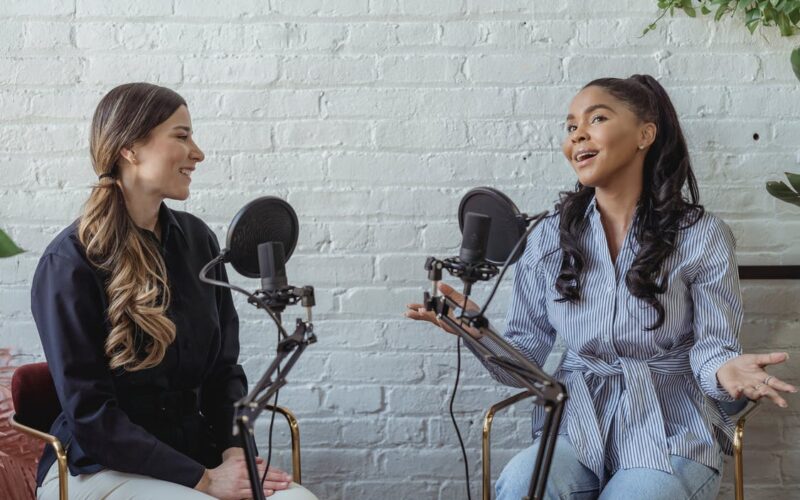If you’re thinking about starting a podcast, you shouldn’t waste any more time – the podcasting industry is booming, with more than 424 million listeners worldwide in 2022, a number estimated to reach 504.9 million in 2024 according to Statista.
And it’s not at all surprising given the variety of topics discussed every day. Whether you listen to podcasts for educational or entertainment purposes (or maybe both), you can find thousands of episodes to satisfy your curiosity. If you already run a business, a podcast makes for an excellent marketing strategy, but even if not, it’s a great side-project idea.
Have you got some catching topics? It would be a pity not to make them known. Be sure that there’s always someone who would be glad to hear your content, learn from your experiences, and empathize with you. But with millions of formats and options to choose from, starting a podcast can be daunting. In a world full of ideas, it’s challenging to make your show stand out, but not impossible.
Before starting a podcast, there are some key factors to consider, so let’s dive into them!
Determine whether this medium is suitable for your message
Before embarking on the journey of launching a show, it’s crucial to make sure this medium is suitable for what you want to transmit. Even if podcasting is an excellent way to market your business or tell your stories, maybe it’s not suitable for your message. We may have gotten an itch to talk about your passions, but perhaps a podcast is not the best way to attract consumers. Formats like videos may convey your message more appropriately, so think carefully about this aspect before launching a podcast not to be surprised you don’t have listeners when the big moment is coming.
Know your audience
One of the most important aspects to have in mind when starting a podcast is figuring out who it is for. Podcasts can cover various themes, but they can also be focused on a single topic. So, if you want to grow a loyal fan base, you’d better have clear and defined topics; listeners would lose interest in your content. Sure, it’s nothing wrong with a broad topic, but make sure it’s engaging enough. For example, let’s say you want to interview some public figures weekly for your podcast and ask lifestyle-related questions. But even in a lifestyle show, you can’t just go with the flow but make sure you stick to specific questions (nutrition, parenting, favorite books or series, travel, etc.). Inviting intriguing guests to your show is a spread and popular podcast idea, but you have many other possibilities. For example, if you’re a personal trainer, you can create a health and fitness podcast. In this case, your target audience wouldn’t be the same as that of a book review podcast, but people interested in exercise, weight management, a healthy diet, or bodybuilding.
Select your format and hosting style
The most popular types of podcasts include co-hosted interviews and solos. But there’s no specific rule when choosing a podcast format; it’s only up to you. Depending on your niche, target audience, and how you feel about the microphone, pick the format that best suits your needs. You can, of course, combine them all, but it would confuse the listeners. If you decide to use the solo, aka monologue format, you need to get over the feeling that you’re talking to yourself. That’s one of the reasons this type of show is considered the most intimidating, but it doesn’t have to. You can attract thousands of listeners if you have the right stories in your pocket because that’s what people are looking for: inspiring stories, helpful advice, charisma, and authenticity. You don’t need anything else but a microphone to captivate the public.
However, if you find it burdensome to fill up airtime, you’d better choose a co-hosted or interview show. When you have someone to debate and bounce off, you can take your self-confidence to the next level, speak casually, and forget there are thousands of people listening to you at that moment.
Pick your podcast gear
We have good news: Starting a podcast won’t break your bank because you don’t need that much to launch the show. Some basic equipment includes a microphone (obviously), a pair of stereo headphones (preferably noise-canceling), a USB audio interface, and editing software. Recording and editing software such as Audacity, Adobe Audition, and Alitu helps you make the most of your episodes, add music for podcasts in the background to enhance the listener’s experience, remove any content that may not fit, and much more. If you don’t have experience in using such software, you don’t have to worry – there are various guides to help you get started.
Find a compelling topic to cover
Forget about titles like “Episode 1” and “Episode 2” – if your episodes sound like that, there are few chances that someone will ever click on them. After all, people want specific, straightforward titles that summarize what you’re going to discuss in that episode or simply a catching title to grab their attention. There are hundreds of episodes that may have potential but are not compelling enough.
As your podcast should speak to a particular audience, try to find episode topics worth watching. You must attract new listeners and keep the actual ones, so find themes that cover your area and give them that sparkle. These days, it is daunting to come up with something new, but you can make a real difference with a touch of humor, for example. Creativity is at the heart of any podcast, so even if it sounds hard, there’s no chance of success if you don’t have ideas. Repeating the same subjects over and over again turns out to be boring for both you and your listeners; that’s why our advice would be to brainstorm a list of episode themes to ensure you have enough material for your next podcast.
Now, all you need to do is decide on your episode length, recording location, and promotion strategy. We hope you have a clearer idea of podcasting and what steps you should follow if you plan to launch your show.
Related Articles: BEST PODCAST EDITING SOFTWARE IN 2023: Top Free & Paid Options






